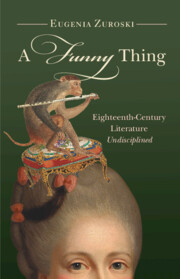Refine search
Actions for selected content:
4 results
Part 1 - The Anamorphic
- from A Morphogenesis
-
- Book:
- A Funny Thing
- Published online:
- 16 May 2025
- Print publication:
- 05 June 2025, pp 13-66
-
- Chapter
- Export citation

A Funny Thing
- Eighteenth-Century Literature Undisciplined
-
- Published online:
- 16 May 2025
- Print publication:
- 05 June 2025
Chapter 19 - Afterlives
-
- Book:
- Hannibal and Scipio
- Published online:
- 05 September 2024
- Print publication:
- 26 September 2024, pp 395-426
-
- Chapter
- Export citation
3 - From Feces to Flowers
-
- Book:
- Dramas of Dignity
- Published online:
- 26 May 2022
- Print publication:
- 09 June 2022, pp 63-79
-
- Chapter
- Export citation
